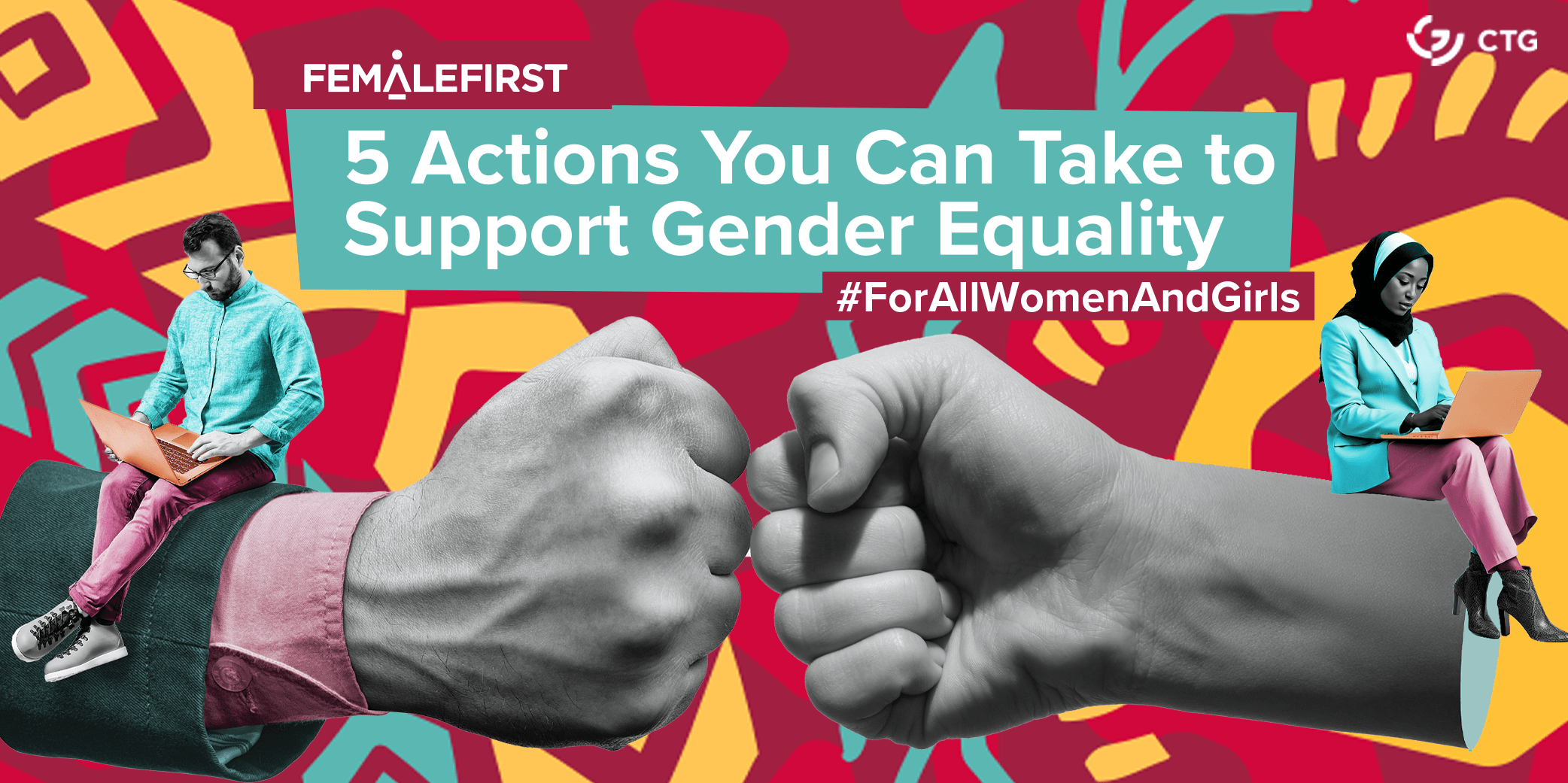5 Actions You Can Take to Support Gender Equality

Gender equality benefits everyone. Societies with greater gender balance tend to be more prosperous, innovative, and resilient. Yet, progress remains slow. In fact, the World Economic Forum’s 2024 Global Gender Gap Report tells us, “Based on current data, it will take 134 years to reach full parity – roughly five generations beyond the 2030 Sustainable Development Goal (SDG) target.”
This International Women’s Day, we highlight five meaningful actions anyone can take – regardless of gender – to be an ally in the fight for gender equality.
What does it mean to be an ally?
An ally is someone who actively supports and stands in solidarity with a cause – amplifying voices, challenging bias, and taking concrete steps toward change. The power of allyship lies in collective action: when more people work together, the momentum for change grows stronger.
Allyship is particularly critical for gender equality, because those in positions of privilege and influence – whether due to their gender, socioeconomic status, or professional standing – can use their power to shift the status quo.
Globally, men still hold most leadership roles in politics, business, and society. Their allyship is essential for dismantling barriers and creating a more equitable world for all. However, women and gender non-conforming people who have gained positions of power also play a vital role in fostering inclusive workplaces, supporting women, and advocating for systemic change.
Why you should act for gender equality
Gender equality is not just a women’s issue – it affects everyone. Discrimination based on gender negatively impacts economies, communities, and entire nations. Here’s why gender allyship should matter to you personally:
- Human rights argument: Women’s rights are human rights, as recognised by the United Nations (UN), and denying human rights strips people of their dignity and humanity – the essence of what it means to be human. Equality ensures that everyone, regardless of gender, can live with the dignity and freedom enshrined in human rights.
- Economic argument: Research by the International Monetary Fund indicates that reducing the gender gap in labour markets could boost GDP in emerging markets and developing economies by nearly 8%. Fully closing the gap would achieve even greater benefits, with an average GDP increase of 23% in these regions.
- Social stability argument: Societies with greater gender equality experience lower rates of violence and stronger social cohesion.
As an ally, your actions – big or small – help accelerate progress for women’s rights. Here are five practical actions you can take to support gender equality in your daily life.
Everyday actions to support gender equality
1. Listen to women’s experiences
Understanding gender inequality starts with listening. Women face unique challenges in every aspect of life – at home, in the workplace, and in public spaces. Take the time to:
- Hear personal experiences without interrupting or dismissing them
- Reflect on how gender bias affects opportunities, safety, and decision-making
- Recognise your own privileges and unconscious biases
When women speak about their challenges, believe them. Research from UN Women highlights that many cases of workplace discrimination and harassment go unreported due to fear of dismissal or retaliation. Being a supportive listener can encourage more women to come forward and advocate for change.
2. Educate yourself
Allyship is an ongoing learning process. Commit time to understanding the structural and cultural barriers women face.
- Take courses on gender equality – the Kaya Connect platform offers free learning resources
- Read research-backed reports from the World Economic Forum’s Gender Gap Report and CTG’s paper on Women, Work and Economic Development
- Follow organisations dedicated to women’s rights, such as Women Deliver and Girls Not Brides
- Explore the HeForShe Male Allyship Toolkit for a structured approach to allyship
The more informed you are, the better equipped you’ll be to challenge inequality effectively.
3. Speak up for gender equality
Silence enables discrimination. If you witness sexist behaviour or policies, use your voice to challenge them.
- Call out bias and discrimination. Whether it’s a sexist joke or an unfair hiring practice, speaking up is a powerful tool for change.
- Report incidents. If you witness harassment in the workplace, report it through the appropriate channels. If it happens in public, intervene safely or support the victim in reporting it.
- Advocate for policy change. Push for better parental leave policies, equal pay, and anti-discrimination protections in your workplace or community. You can learn from organisations whose policies and procedures are geared towards ethics and equity, too.
4. Support women’s leadership and growth
Gender gaps persist in leadership and decision-making roles. As an ally, you can help close these gaps by:
- Encouraging women in your team to speak up in meetings and put themselves forward for leadership opportunities
- Mentoring or sponsoring women in your organisation to help them advance in their careers
- Ensuring women have equal access to training, promotions, and professional development opportunities
- Investing in corporate internship programmes that drive gender equality for the long-term
5. Make inclusion the norm
Representation matters. Women must be included in decision-making at all levels. Consider:
- If you’re organising a meeting or event, ensure women are represented in leadership and speaking roles
- When hiring or promoting, challenge unconscious bias and advocate for diverse candidates
- In policy discussions, invite women’s perspectives, particularly those from marginalised groups
As former UN Secretary-General Ban Ki-moon said: “Achieving gender equality requires the engagement of women and men, girls and boys. It is everyone’s responsibility.” Being an ally for gender equality doesn’t always require grand gestures. Consistent, everyday actions can create lasting change.
This International Women’s Day, commit to one concrete action #ForAllWomenAndGirls.
This article was written as part of CTG’s commitment to gender equality in fragile and conflict-affected regions. Learn more about our Female First programme, which is designed to help create a more equitable and inclusive aid and development sector.
